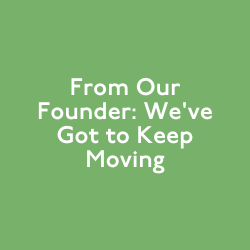Written by Founder and CEO, Sara Potler LaHayne
I was squatting in the office of an ad agency with my four full-time employees and handful of volunteer interns. The seven or so of us were crowded around three desks that we could “claim,” albeit temporarily. We had no money and a big dream. We were going to make emotional wellbeing accessible to everybody.
At 5:45pm that day I had heard one too many rejections, encountered an obstacle that pushed me over the edge, and faced a resistor who was dead set on proving me and my work incapable of succeeding. When my mentor and the head of said ad agency pulled me into a conference room to deliver tough news and yet another blow to my day, the feelings started coming. I couldn’t help it. It’s every female leader’s nightmare. The tears began flowing. Hard.
There I was, standing in front of a well-respected, accomplished businessman, crying. I wanted him to see me as a competent CEO, aware of my emotions and able to manage them in front of my team and him. I wanted him to not see me for the big-hearted 25-year-old I was at the time and instead for a strategic, high-achieving entrepreneur. None of my emotional management techniques worked. Tears streamed down my face and stained my shirt. As I worked to pull it together, I wondered: Why is it so hard to be authentically expressive and manage the volatility of building an organization at the same time? How do leaders allow themselves to feel, while not being distracted by those emotions and staying focused on the course ahead?
Empathetic leaders are more adept at managing teams toward success, addressing interpersonal conflict, and transforming their businesses. According to Simon Sinek, best-selling author, speaker and leadership consultant, “The daily practice of putting the wellbeing of others first has a compounding and reciprocal effect in relationships, in friendships, in the way we treat our clients and our colleagues.” Sinek’s research shows that in expressing empathetic behavior, our brain releases oxytocin, which allows us to form long-lasting bonds and build trust in one another. In a workplace setting this translates to better relationships with your employees and building an environment based on trust and transparency. We know we want to cultivate empathetic leaders, but the question is how? And is there a point when we are being too empathetic or expressive? How do we balance empathy for ourselves and those around us while still holding both parties accountable for high standards of excellence in the workplace?
The balance between empathy and accountability is tough for all leaders, but even tougher for women. We’re watching Hillary Clinton get flack for getting sick and coming down with pneumonia. Does the fact that she’s sick mean she’s weak? Would we have the same response to a man feeling under the weather? A woman in the workplace stands up for her beliefs and works hard to achieve designated goals, and she’s billed “aggressive” for holding herself and her team accountable. A man in the workplace models the same behavior, and he’s “strong,” “articulate,” or “influential.” What’s the distinction? When both individuals are achieving the same success through like-minded leadership styles, where is the disconnect? The women of the Obama administration were recently in the news for what they called “amplification” strategies: the idea of reaffirming opinions and ideas of their female colleagues to ensure that not only was the idea presented, but also appropriated to the person who actually conceived it. What does it say about the gender equality of our nation if women holding some of the most prominent positions in America feel unheard, unappreciated and unsupported? We are choosing to label and define leaders based on dated social norms instead of their deliverables and behavior.
In order to support the wellbeing of women leaders and their resiliency in the face of challenges, we must ensure women and men together are acknowledging the emotional baggage we all carry as human beings and our collective responsibility to support one another to succeed. Let’s lift each other up and find moments to let the tears flow when they need to- because we all need a release- and then wipe them off and move on. Once we allow ourselves to feel, we can harness those emotions as empathetic leaders to inspire and hold our teams accountable to the standards of excellence we refuse to compromise.










